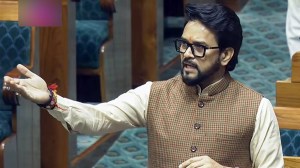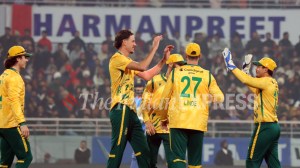Iran resolution warns of ‘future measures’
Over Chinese and Russian opposition, Western nations circulated a UN Security Council resolution that would demand Iran abandon uranium enrichment or face the threat of unspecified further measures...

Over Chinese and Russian opposition, Western nations circulated a UN Security Council resolution that would demand Iran abandon uranium enrichment or face the threat of unspecified further measures, a possible reference to sanctions.
Britain and France, backed by the United States, hope to wrap up negotiations on the legally binding resolution before a meeting of foreign ministers in New York on Monday. However, diplomats acknowledged that resistance from China and Russia may prolong talks well beyond that.
The resolution is the latest in weeks of negotiations over how to confront suspicions about Iran’s nuclear programme, which Tehran insists is for peaceful purposes. The United States and France accuse the country of secretly trying to build nuclear weapons.
‘‘Once again, the key to this lies in Iran’s hands,’’ US Ambassador John Bolton said. ‘‘If they give up the pursuit of nuclear weapons, a lot of things are possible. If they continue to bluster and to threaten and obfuscate and try to throw sand in our eyes, then we’re onto a different circumstance.’’
The resolution mandates that Iran suspend enrichment and warns UNSC would ‘‘consider such further measures as may be necessary to ensure compliance’’—language that opens the door to sanctions.
It calls on Iran to stop construction of a heavy-water reactor and demands that nations ‘‘exercise vigilance’’ in blocking the transfer of goods and technology that could help Iran’s uranium reprocessing and missile programmes. UNSC would also seek a report back from the UN nuclear watchdog, the International Atomic Energy Agency, on Iran’s compliance.
No time frame has been set for that report but France’s UN Ambassador Jean Marc de La Sabliere said he wanted it no later than early June. The resolution was written under Chapter 7 of the UN Charter, which makes any demands mandatory and allows for the use of sanctions—and possibly force—if they are not obeyed. Any sanctions would require another resolution.
That could force a showdown with Russia, which has arms and technology deals with Iran, as well as China. Both nations have said they adamantly oppose tough UNSC action, including sanctions, and the two could use their veto power on the council to block it.
‘‘I don’t think this draft as it stands now will produce good results,’’ China’s UN Ambassador Wang Guangya said.
Meanwhile, President Bush has stressed that the US will continue to focus on diplomacy. But he refuses to rule out military action if necessary. When asked last month if the US would consider ‘‘the possibility of a nuclear strike’’ if Tehran refuses to halt uranium enrichment, Bush said.
Russia, a firm opponent of the resolution, was clearly wary that some language in the new draft could be seen as opening the door to military action. That would likely include the reference to “further measures.”
“We do not believe the matter can be resolved by use of force, so that does reflect in our attitude to various possibilities in the text of the resolution,” Russia’s UN Ambassador Vitaly Churkin said.
NICK WADHAMS
- 01
- 02
- 03
- 04
- 05































